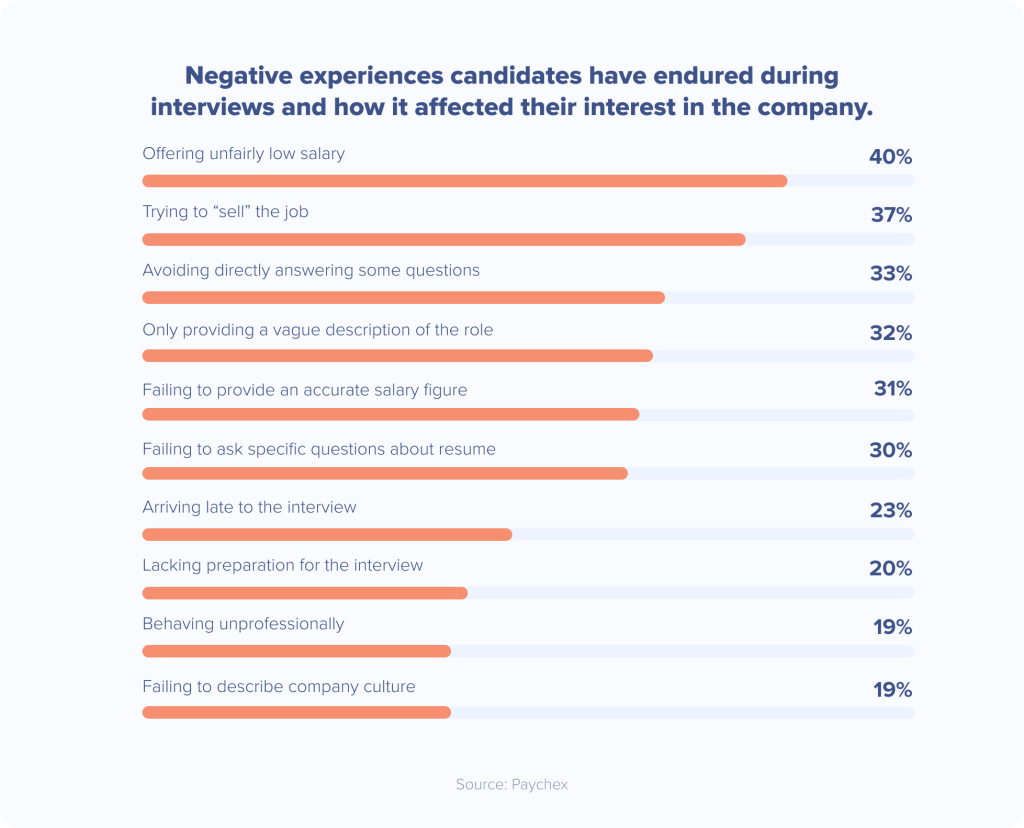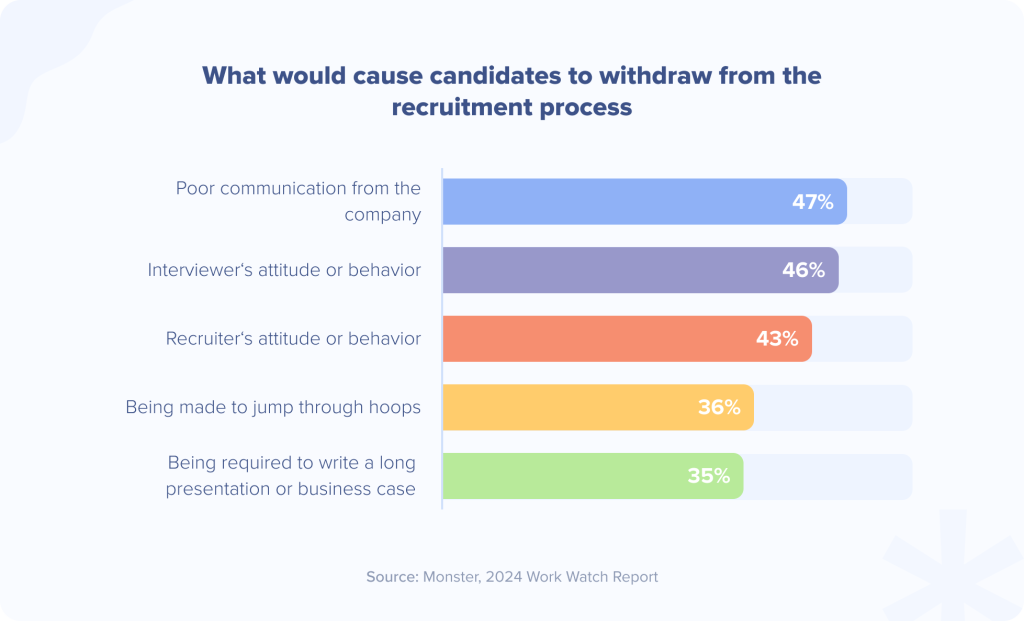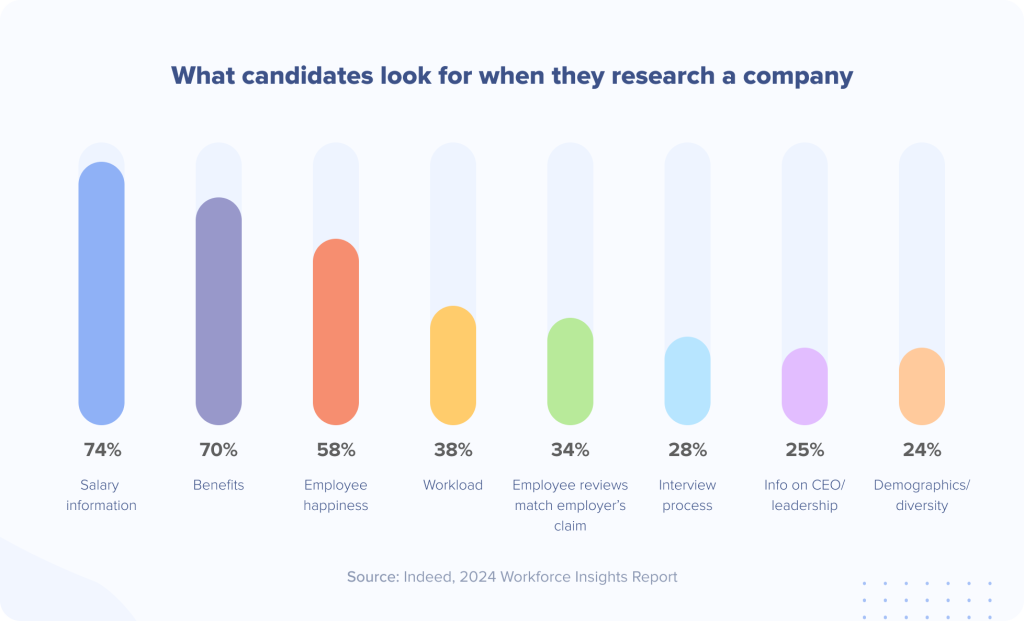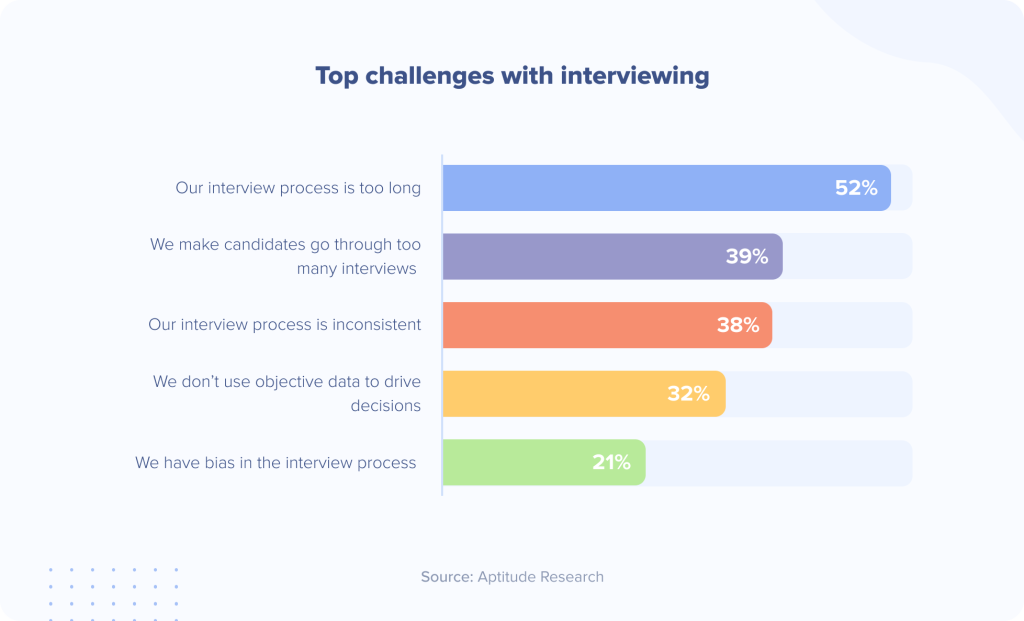
Subscribe for updates
Get talent acquisition best practices, trends, and news delivered directly to your inbox.
By entering your email, you agree to receive marketing emails from JobScore
Want to get a quick pulse on the state of interviews in 2026? These job interview statistics provide useful insight on how to improve your process for better hiring outcomes.
The interview process isn’t just an opportunity for you to evaluate job candidates, it’s also an opportunity for your job candidates to evaluate your organization. The way you treat candidates during this part of the recruitment process impacts your ability to engage and hire them to your team — and could have a lasting impact on your employer brand.
That’s a shame, because only 24% of candidates are happy with the interview process. Learn why — and what you can do about it.
55% of applicants will give up if they don’t schedule their first interview within a week
Candidates are eager to hear back after submitting an application and may lose interest if they don’t schedule their first interview quickly. In fact, 42% of candidates have left the recruitment process when it took too long to schedule an interview.
While 5% of applicants expect to schedule an interview within a day of their application, 21% will wait 2–6 days and another 29% will wait a week. This leaves quite a bit of room for improvement: 31% of interviews are scheduled 2-3 weeks after a candidate applies and another 14% are scheduled a month or more after application.
A modern applicant tracking system can help you quickly review resumes and enable candidates to self-schedule their first interview at a time that’s most convenient for them.
40% of candidates say receiving a low salary is the most off-putting interviewer behavior
The biggest complaint candidates have with interviewers is actually related to compensation.
Four in 10 Paychex survey respondents say offering an unfairly low salary is the most off-putting interviewer behavior they’ve experienced. Slightly more than half of these job seekers (51%) have withdrawn their candidacy as a result of a low job offer. Further, 31% say failing to provide an accurate salary figure is the most off-putting behavior, with 35% of those candidates withdrawing their candidacy as a result.

Compensation is clearly a big consideration for job seekers. Consider disclosing a pay range in your job postings to reduce candidate withdrawals during the interview process. Many of the other common complaints can be addressed through a comprehensive interviewer training program.
46% of candidates said an interviewer’s attitude would cause them to withdraw
Treating candidates poorly during the interview process can cause significant leaks in your talent pipeline. Nearly half of candidates (46%) said an interviewer’s attitude or behavior would cause them to voluntarily pull out of the recruitment process. And 43% said a recruiter’s attitude or behavior would cause them to withdraw.

Make sure candidate experience surveys are part of your recruitment process so you can catch — and address — issues that are leading to candidate churn.
1 in 3 candidates have experienced bias in the interview process
One-third of candidates have experienced bias in the interview process. Whether conscious or unconscious, bias can significantly impact hiring decisions, leading to missed opportunities for both your company and your candidates. Despite this, only 21% of companies have identified bias as a top challenge with interviewing.
It’s crucial to build an equitable hiring process that gives all candidates an opportunity to shine. For example, bias training and structured interviews can help interviewers evaluate candidates more fairly.
28% of candidates want to know your interview process ahead of time
Over half of candidates (54%) said they typically research every company before applying. While the vast majority are looking for salary (74%) and benefits (70%) information, more than a quarter want to know about your interview process.

Include detailed information on your careers site and job descriptions to help candidates research your organization. Helping them understand why they might want to work at your company and the evaluation process you use can simplify their decision to apply.
Keep in mind, however, that a cumbersome interview process can fatigue candidates. About a third of candidates (32%) said that 2–3 interview rounds was too many, and 52% said 4–5 interview rounds was too many. Minimize your number of job interviews to keep candidates engaged in your hiring process.
52% of companies have an interview process that lasts 4–6 weeks
Over half of employers make candidates go through four or more interviews, and have a process that lasts 4–6 weeks. This is a well-known problem: Companies list a long interview process as their top interviewing challenge.

Your candidates may lose interest or accept offers from other companies if your interview process takes too long. In fact, 32% of North American candidates that withdrew from the recruiting process said they accepted another offer from a different company.
Consider how you can speed up your interview process, perhaps by reducing the number of interviews or making faster hiring decisions.
40% of job seekers have been ghosted after an interview
Most candidates (83%) want to know as soon as possible when they’re no longer being considered for a job. Instead, many aren’t hearing back at all: 40% of job seekers said they were ghosted after a second or third round interview.
Following up with candidates can end your interview process on a high note, especially if you provide feedback. Most candidates (70%) say that receiving a clear reason for why they aren’t selected would leave them with a positive impression of the company. In fact, finalists who receive feedback are 30-50% more willing to refer others than those who don’t get feedback.
Modern applicant tracking systems make it easy to automate candidate rejection letters so you can keep candidates informed.
Final thoughts on these job interview statistics
It’s no surprise that half of employers have lost quality talent due to a poor interview process. In fact, the interview stage is the biggest candidate drop-off point in the entire recruitment process. Unfortunately, it can be the most in-demand candidates you lose — skilled job seekers often have many other opportunities available to them and won’t stick around if you disrespect their time and effort.
Take the time to identify shortfalls in your interview process — and address them. Any time spent on improvements is likely to pay off: 72% of say the smoothness of an interview process would affect their final decision on whether or not to take a job.
Want to learn how JobScore can help you elevate your interview process?



